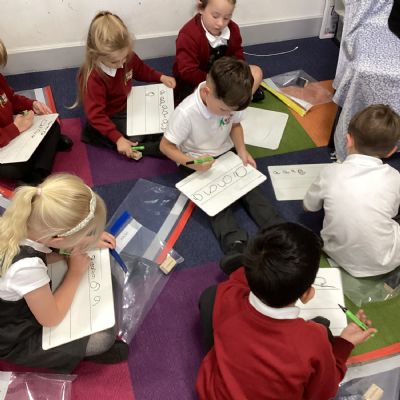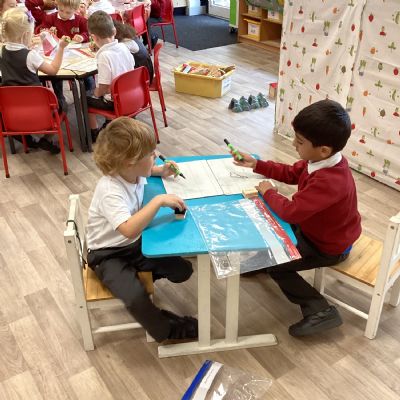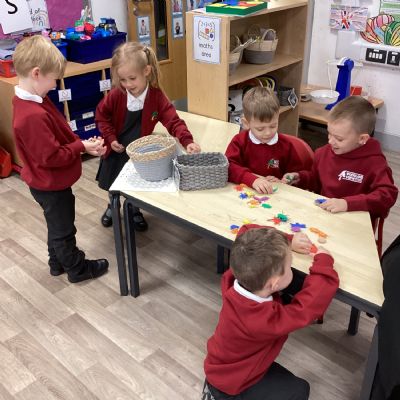EYFS
The Foundation Stage is a bright and vibrant environment that immerses children in their learning. It is a place of awe and wonder where children are engaged with interesting resources that promote talking, thinking and challenge.
At Woodland View, we understand that children learn best when they are engaged and motivated, which is why we provide a range of learning experiences based around six exciting themes across the year. Our Foundation Stage uses these themes to build the foundations of learning across all areas of the curriculum. Through our supportive and challenging approach, we ensure that children’s knowledge and skills are continually growing, from their individual starting points, in order to achieve their full potential and ensure a smooth transition into Key Stage 1.

Our aims:
- To promote positivity and resilience
- To develop independence
- To ensure all children feel safe and secure
- To develop a love of learning
- To engage, motivate and inspire
- To build a strong foundation of knowledge and skills
At Woodland View, we present learning in many different ways. This includes whole class, small group and individual work, adult-led, adult-directed and independent learning. We have a highly experienced team of staff, who are skilled in monitoring how and what the children are doing. As appropriate, they provide modelling, scaffolding and direct teaching - according to the situation and needs of each child - to ensure that progression is made across all areas of the curriculum.
Understanding the way in which children learn is an important part of school life. This is why the Characteristics of Effective Learning are an integral part of our curriculum. Therefore, providing our children with opportunities to learn in different ways is a fundamental part of our planning process.
We know that for learning to be effective it must promote curiosity and ensure that children approach it with enthusiasm and energy. Therefore, we plan engaging activities which give children time to explore, test and maintain their interest in order to build up concentration levels. Additionally, we give them access to a variety of activities that challenge them to think, ask questions, explore ideas and make links to previous learning.
Our skilled staff are always around to give the children encouragement to 'have a go' and help them to learn from the things that don’t go well - as well as the things that do.
Communication and Language
Communication is at the heart of our Foundation Stage curriculum. Children are given opportunities to talk about things that interest them. Our first theme is ‘Happy to be me’; children discuss the similarities and differences between themselves, their families and those around them.
As the year progresses, these ideas about similarities and differences are extended to include discussions about celebrations, dinosaurs, countries, plants, animals, vehicles, journeys and so much more.
Each week begins with an engaging story or non-fiction book based around the mini-theme for that week. Through these books, new vocabulary is introduced and then built upon throughout the year. Children are encouraged to listen to and participate in these stories: sharing in oral retellings; talking to each other about the texts; asking questions about the characters, themes and texts. All of these things help to further the children's understanding of language. Our staff are always on hand to support and challenge the children's communication and language work, whilst ensuring that all children are working towards achieving the Early Learning Goals.
Early Learning Goals
Listening, Attention and Understanding
Listen attentively and respond to what they hear with relevant questions, comments and actions when being read to and during whole-class discussions and small group interactions.
Make comments about what they have heard and ask questions to clarify their understanding.
Hold conversations when engaged in back-and-forth exchanges with their teacher and peers
Speaking
Participate in small group, class and one-to-one discussions, offering their own ideas, using recently introduced vocabulary.
Offer explanations for why things might happen, making use of recently introduced vocabulary from stories, non-fiction, rhymes and poems when appropriate.
Express their ideas and feelings about their experiences using full sentences, including the use of past, present and future tenses and making use of conjunctions, with modelling and support from their teacher.
Personal, Social and Emotional Development
We understand that when children feel safe and happy, they thrive and learn best. Therefore, our staff aim to develop strong relationships with our children right from the start of the Foundation Stage. Our staff go to great lengths to ensure that all our children feel happy, safe and settled when they come to school.
We pride ourselves on creating independent learners that have the confidence to try their hardest at everything they do. Therefore, we support children to persevere, even when they find things hard, while ensuring that they know that they can ask for help if or whenever they need it.
Promoting collaborative work is important - often using talk partners and group work to develop an understanding of team work. We want our children to feel confident to share their own knowledge and understanding with others, while also taking on new ideas and knowledge from those around them. The Foundation Stage team are always exploring new ways to challenge and engage our children. Our kind and professional staff are always there to support and challenge and ensure that all children are working towards achieving the Early Learning Goals.
Early Learning Goals
Self-regulation
Show an understanding of their own feelings and those of others, and begin to regulate their behaviour accordingly.
Set and work towards simple goals, being able to wait for what they want and control their immediate impulses when appropriate.
Give focused attention to what the teacher says, responding appropriately even when engaged in activity, and show an ability to follow instructions involving several ideas or actions.
Managing Self
Manage their own basic hygiene and personal needs, including dressing, going to the toilet and understanding the importance of healthy food choices.
Explain the reasons for rules, know right from wrong and try to behave accordingly.
Be confident to try new activities and show independence, resilience and perseverance in the face of challenge.
Building Relationships
Work and play cooperatively and take turns with others.
Form positive attachments to adults and friendships with peers.
Show sensitivity to their own and to others’ needs.
Physical Development
We provide the children with many opportunities to develop their physical skills. Each week, children have a planned PE lesson, which builds up specific skills such as dance, gymnastics and ball skills. In addition, we have our learning garden, which is open throughout the day; in this space, there is access to a large climbing frame with a firefighter’s pole and gigantic tractor tyres to climb on, over, and around. Alongside this provision, there is various large equipment, such as crates, wooden planks, balance boards, bikes and scooters, which enable children to increase their strength, balance and coordination. Additionally, the balls, beanbags, skittles, hoops, rackets and other such equipment means that children can combine physical activities with group work as they develop games with rules and learn more about being a member of a team.
Fine motor skills are also developed outside as we have an art area where children have access to big paper, paint and other creative media. Alongside this is our construction area where children can learn how to use tools and equipment such as nuts, bolts, screws, nails, hammers and screwdrivers to create things using wood. Finally, our outside writing area provides a place for children to access mark making in a range of different ways, such as by using giant chalks or taking their writing away from a table.
Inside, the children have access to a large craft area where there are various resources that they can choose from, including different materials and tools such as scissors, tape, split pins and glue. Here, the children not only develop fine motor skills but also learn to be creative and communicate with others as they are doing so. Another way that the children can develop their physical skills inside is using the writing and construction areas. Here, they are provided with stimulating resources to engage their interests.
Adults plan challenges and specific activities, such as drawing, sewing, weaving, tweezer tasks, tracing and more to ensure that children are developing the muscles and coordination that they need. Our staff are always there to support and challenge and ensure that all children are working towards achieving the Early Learning Goals.
Early Learning Goals
Gross Motor Skills
Negotiate space and obstacles safely, with consideration for themselves and others.
Demonstrate strength, balance and coordination when playing. Move energetically, such as running, jumping, dancing, hopping, skipping and climbing.
Fine Motor Skills
Hold a pencil effectively in preparation for fluent writing – using the tripod grip in almost all cases.
Use a range of small tools, including scissors, paintbrushes and cutlery. Begin to show accuracy and care when drawing.
Literacy
At Woodland View, we see reading as a fundamental skill: it is our view that once children have mastered the skill of reading, it opens them up to infinite possibilities to learn about the world around them. This is why we, as a staff team, read to the children at every opportunity right from the start of the year.
By sharing books, we give the children new experiences and open them up to new vocabulary. Every week, we read the children a book which links to our topic. As a class, we work on learning this story and use a story map to help when orally retelling it. Each book is carefully chosen to inspire children's learning and is used as a stimulus for discussion. During these conversations, we engage the children with questions, statements and things to ponder; this ensures that children develop the skills and confidence to share their thoughts, feelings and ideas about the chosen text.
These discussions are then used to develop and inspire the children’s writing as they then write for a purpose. Writing activities can be in many forms: writing labels for images, writing phrases from the stories or even rewriting their own version of the story. Children are encouraged to come up with their own ideas, taking ownership of their writing; as the year progresses, we focus on ensuring that children begin to develop a good understanding of basic sentence structure and basic punctuation.
Children are taught to write through our Read Write Inc phonics scheme using helpful rhymes, so that they understand where letters begin and end. This is followed up in handwriting sessions and through our continuous provision.
Early Learning Goals
Comprehension
Demonstrate an understanding of what has been read to them by retelling stories and narratives using their own words and recently introduced vocabulary.
Anticipate (where appropriate) key events in stories.
Use and understand recently introduced vocabulary during discussions about stories, non-fiction, rhymes and poems and during role-play.
Word Reading
Say a sound for each letter in the alphabet and at least 10 digraphs.
Read words consistent with their phonic knowledge by sound-blending.
Read aloud simple sentences and books that are consistent with their phonic knowledge, including some common exception words.
Writing
Write recognisable letters, most of which are correctly formed.
Spell words by identifying sounds in them and representing the sounds with a letter or letters.
Write simple phrases and sentences that can be read by others.
Mathematics
Maths is everywhere at Woodland View and is built into our everyday learning: from counting how many children are lined up, or working out parts of whole amounts during register time, to completing the calendar every morning and looking at how tall our plants have grown. We understand the importance of teaching new maths skills and then giving children the time and opportunities to practise these new skills.
Physical maths resources are always available in our maths area and in other areas of the classrooms to aid and develop children's understanding of key skills, such as sharing out the food for the Teddy Bears’ picnic, showing different ways to make five using flip counters or using concrete objects to create patterns.
Our staff use questioning to challenge the children’s thinking and encourage them to answer in full sentences and deepen their understanding. Alongside physical resources, we use pictorial representations and present problems, ensuring children experience different ways of learning and using the same skills; this allows the children to embed these skills further. Additionally, we make sure that the children have opportunities to reason, problem solve and gain fluency in their mathematical understanding. We also encourage the children to work collaboratively, either in pairs or in small groups, as this further aids the children in securing knowledge and understanding.
Early Learning Goals
Number
Have a deep understanding of numbers to 10, including the composition of each number.
Subitise (recognise quantities without counting) up to 5.
Automatically recall (without reference to rhymes, counting or other aids) number bonds up to 5 (including subtraction facts) and some number bonds to 10, including double facts.
Number Pattern
Verbally count beyond 20, recognising the pattern of the counting system.
Compare quantities up to 10 in different contexts, recognising when one quantity is greater than, less than, or the same as the other quantity.
Explore and represent patterns within numbers up to 10, including evens and odds, double facts and how quantities can be distributed equally.
Expressive Arts and Design
We provide many opportunities for the children to be creative in different ways and in different areas of our provision. We have a role-play area inside and outside (and small world scenes). Our outside roleplay is linked to the current theme, as this allows the children to act out stories and scenarios that they have been learning about.
Inside we have a domestic role play, which allows the children to take on roles and act out scenarios they are familiar with. Throughout the year, our house is built by the children, babies are born, we get a class pet and, at the end of the year, we sell our house as we prepare to move into Year 1.
The children have free access to a well-stocked craft area where they can use tools and materials to create ideas that they have on their own (or as directed by the staff team). In these instances, staff are there to teach specific skills, such as using watercolour paints or moulding clay. The children are then given opportunities to develop their creativity using these newly acquired skills.
The construction and investigation station areas are other places where children can get creative - drawing designs, exploring materials and their properties, and building models. Staff encourage children to talk about what they are creating and how and why they are using certain tools, techniques and materials.
Musically, we use a range of nursery rhymes and songs. As their repetitive nature and simple rhythmic patterns help the children develop listening skills, which they can apply in other areas of the curriculum. Alongside singing, the children explore the different sounds of instruments, how they can be used through taught music lessons and how they can access instruments on our outside stage.
Early Learning Goals
Being imaginative and expressive
Invent, adapt and recount narratives and stories with peers and their teacher.
Sing a range of well-known nursery rhymes and songs.
Perform songs, rhymes, poems and stories with others, and (when appropriate) try to move in time with music.
Creating with Materials
Safely use and explore a variety of materials, tools and techniques, experimenting with colour, design, texture, form and function.
Share their creations, explaining the process they have used.
Make use of props and materials when role-playing characters in narratives and stories.
Understanding the World
During our children's time in Foundation Stage, we aim to immerse our children in as many exciting and varied experiences as possible. To do this we have the fantastic resource of our Immersive Room. Using this facility we have visited Antarctica to watch the penguins, flown through space to look at the planets, dived under the sea in a submarine, visited the earth when dinosaurs roamed, explored different parts of Africa and Europe and remembered those who fought and died in the World Wars. These Immersive Room experiences give the children a feeling that they have been to these places, while captivating their enjoyment and immersing them in the learning.
Additionally, we go for walks around the local area, explore woodlands, visit local attractions and frequently use our Woodland Workshop and pond area. All of these hands-on learning experiences help to ensure that the children's learning is memorable. The children have access to our learning garden every day and our staff are there to support learning as we talk with the children about the weather, the seasons and the changes in animals and plants that can be observed.
During our ‘Join the celebration’ theme, we have our own Diwali celebrations and plan weddings and birthday parties, where the children organise the events and make decorations for them. We also learn about other festivals, people and places through books. We choose these books carefully to ensure that the children are exposed to the many different faiths and cultures that we have in this country and across the world.
We frequently look at our giant world map in the studio, to find out where places are and look at and discuss the similarities and differences between these places.
We ensure that our children recognise that they are all different, and they are unique, in their own way. Additionally, we promote our value of kindness to everyone, even if they don't like the same things.
Talking about things that they have done with their families in the past is encouraged along with discussion about how the children have changed as they have grown. We look at how the world has also changed by going back to when dinosaurs lived on the planet, the Stone Age and find out how transport has evolved. Furthermore, we encourage the children to discuss what it might have been like to live during these different times and how things have changed in the modern world.
Early Learning Goals
People, Cultures and Communities
Describe their immediate environment using knowledge from observation, discussion, stories, non-fiction texts and maps.
Explain some similarities and differences between life in this country and life in other countries, drawing on knowledge from stories, non-fiction texts and (when appropriate) maps.
Know some similarities and differences between different religious and cultural communities in this country, drawing on their experiences and what has been read in class.
Past and Present
Talk about the lives of the people around them and their roles in society.
Know some similarities and differences between things in the past and now, drawing on their experiences and what has been read in class.
Understand the past through settings, characters and events encountered in books read in class and storytelling.
The Natural World
Explore the natural world around them, making observations and drawing pictures of animals and plants.
Know some similarities and differences between the natural world around them and contrasting environments, drawing on their experiences and what has been read in class.
Understand some important processes and changes in the natural world around them, including the seasons and changing states of matter.
Reading and Phonics in the Foundation Stage
Alongside the books that we read the children in class and use for our literacy activities each week, the children take home a school reading book. At the beginning of the year these books are wordless and we encourage the children to create and tell stories using the pictures. Then, as their phonic knowledge progresses and they are able to segment and blend words, they will start to take home books with words that are in line with our phonics scheme.
With their reading books, we also encourage the children to learn high-frequency words by sight. These are sent home with the children and also worked on weekly at school. All of this really helps children to become successful readers right from the beginning of the year.
Once the children begin full-time, we start teaching phonics, learning the sounds that letters make and how to use these sounds to read and write words. When the children are confident in using their sounds, they will then start to take home Read Write Inc phonics books.
Not only do the children have their reading books (and eventually phonics books) to share at home, they have a weekly school library session where they have the opportunity to choose a book to take home and share with their grown-ups.
Using these different approaches allows us to share our love of reading and stories and means that we are developing successful readers who can use their phonic knowledge, their word knowledge and their comprehension skills in order to read and enjoy a whole range of books.



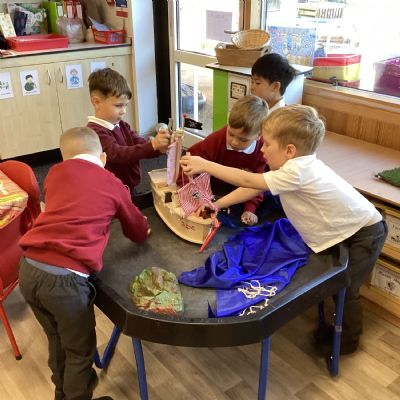
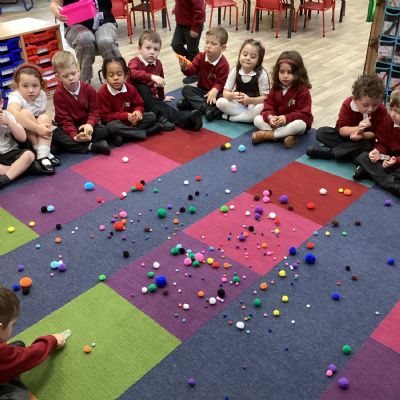
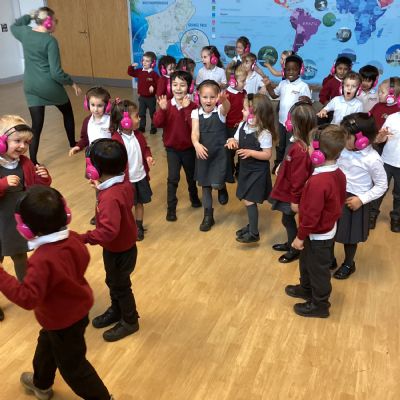
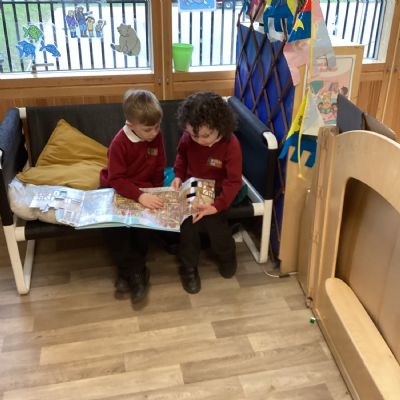
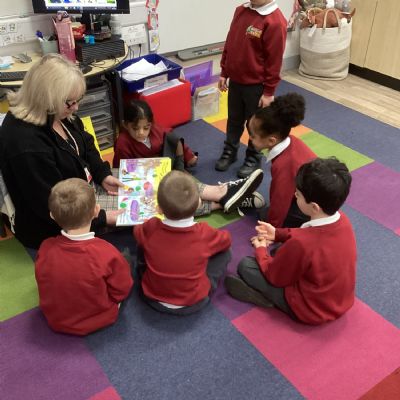
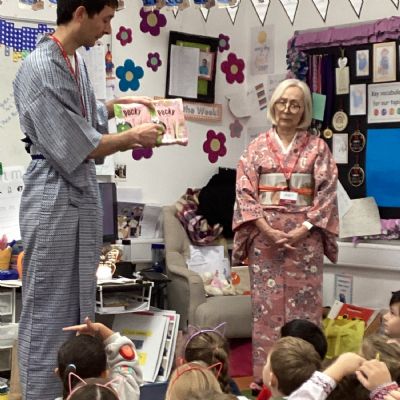
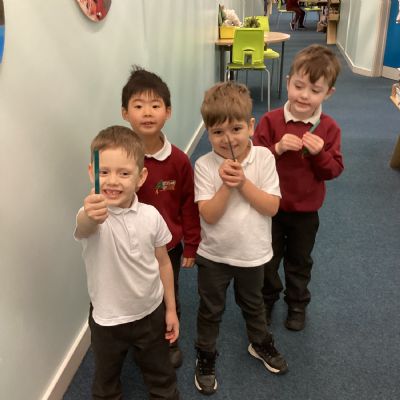
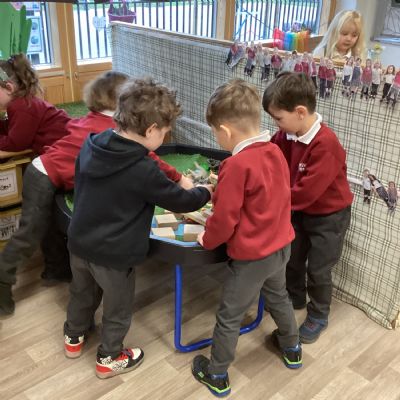
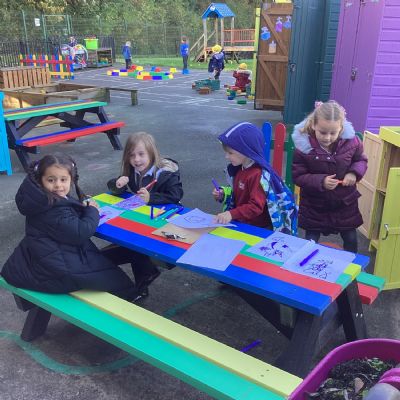
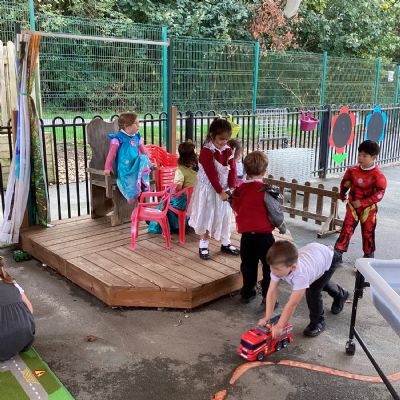
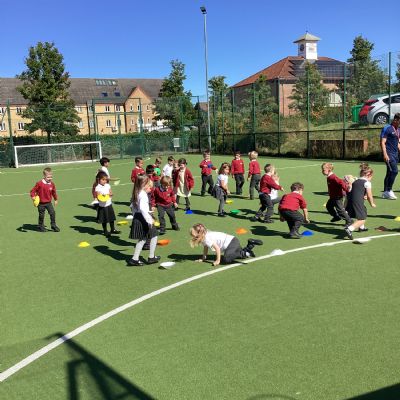
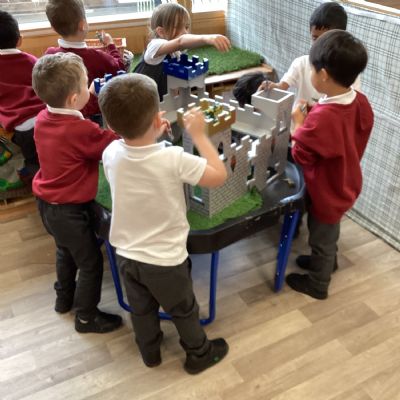

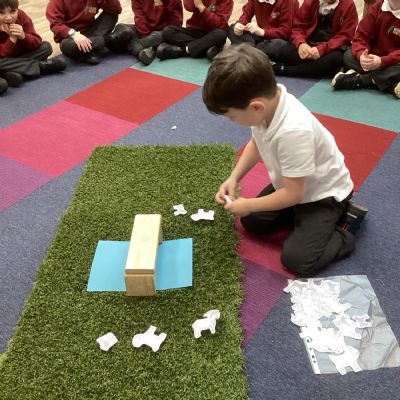
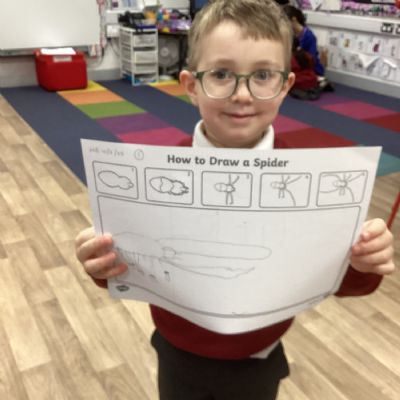
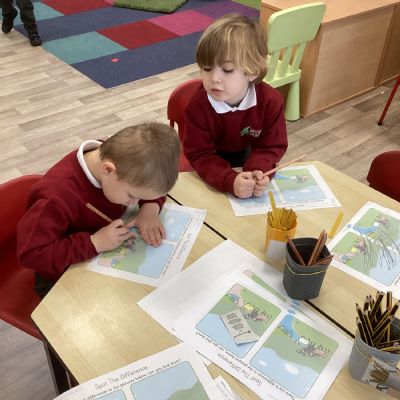
.JPG)
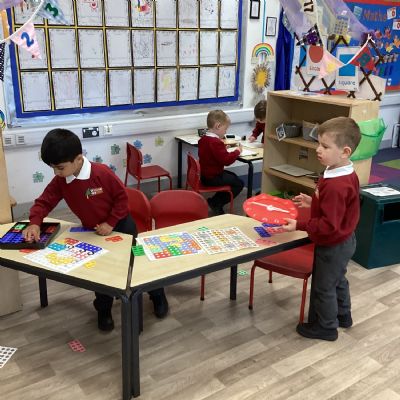
.JPG)
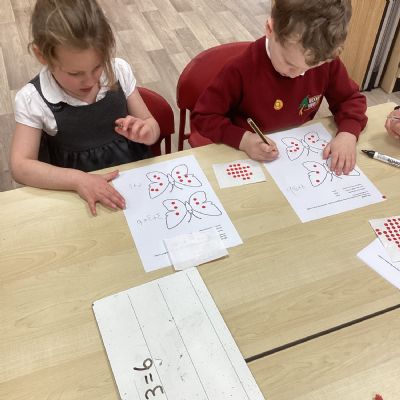
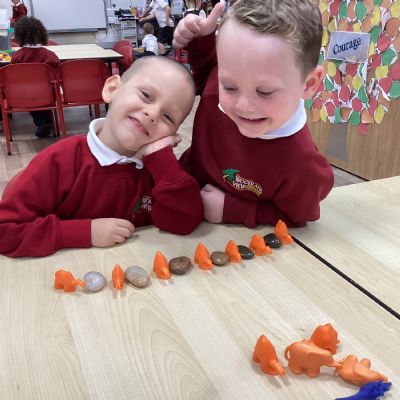
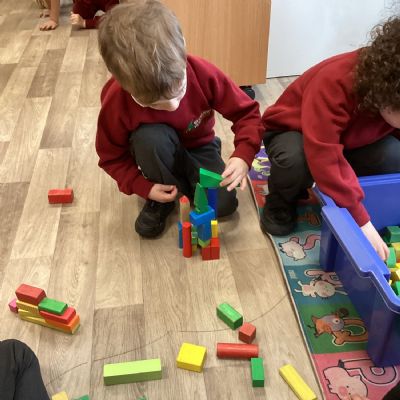
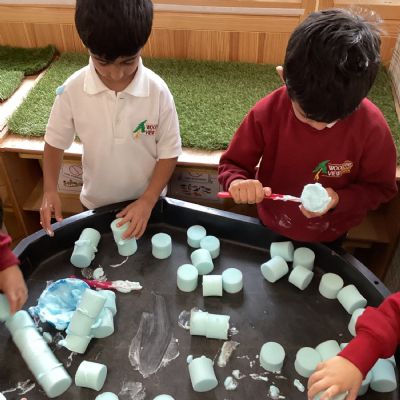
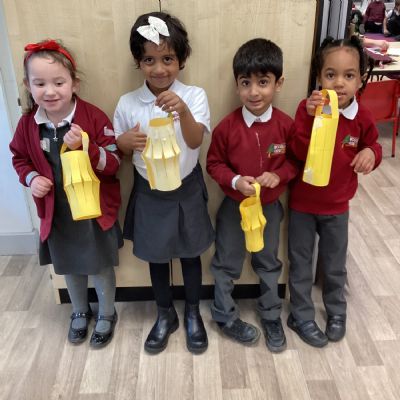
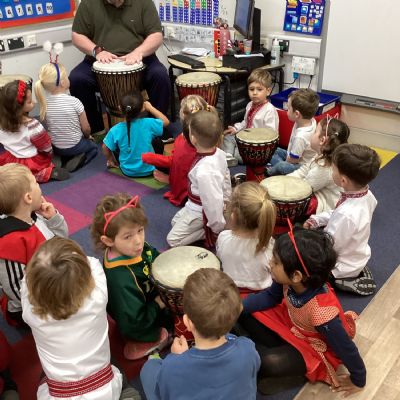
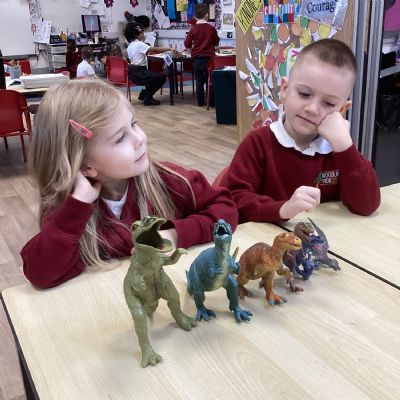
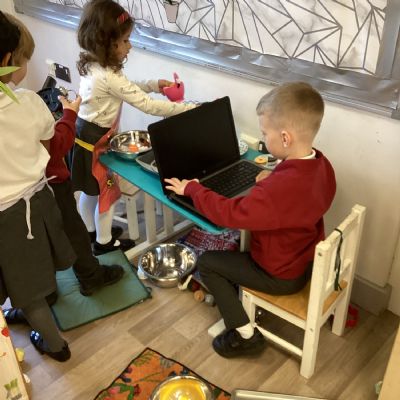
.JPG)
